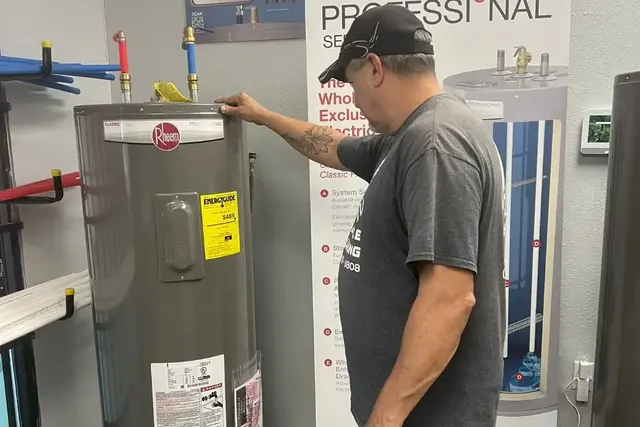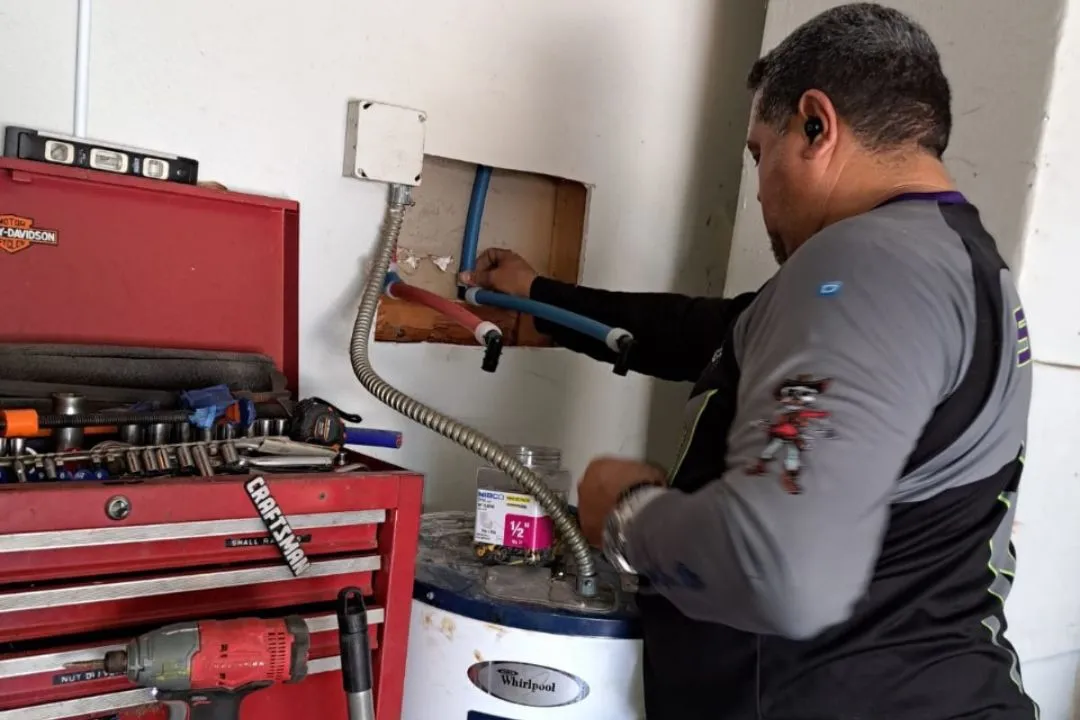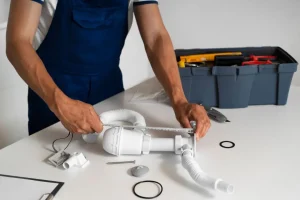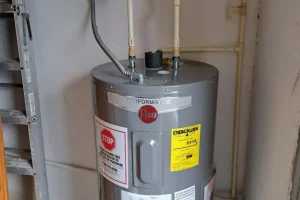Choosing between fixing your water heater and getting a new one can take time and effort. It can also create confusion.
Imagine this: your shower suddenly turns icy, leaving you shivering. A repair might seem like a quick fix, but is it the best move for a long period?
Or should you invest in a new heater that promises warmth for years to come? In locales like Orlando, Kissimmee, and the surrounding metropolitan regions, individuals often face the dilemma of choosing between immediate hot water needs and seeking lasting comfort. Factors like weather conditions and personal preferences can further complicate this decision.
So, let’s solve this puzzle and find the best solution to keep those showers steamy and your home comfortable.
Repair and Replacement: What Do They Mean?
Understanding the options for repair and replacement is essential when dealing with a faulty water heater. Repair involves fixing the existing issues with the water heater to restore its functionality, while replacement means removing the old unit and installing a new one in its place.
Repair is a practical choice, focusing on specific problems like a malfunctioning thermostat, a leaking tank, or a faulty heating element. This option is not only less expensive and faster than replacement, but it also provides a sense of financial security.
It’s an attractive choice for minor issues or when budget constraints are a concern. For example, if your water heater is relatively new and only requires a simple fix, a repair may be the most cost-effective solution.
On the other hand, replacement becomes necessary when the water heater’s lifespan is almost finished, or it’s beyond repair.
Older units usually experience frequent breakdowns or significant issues, such as corrosion or a cracked tank. In that circumstance, they should be replaced to ensure a reliable hot water supply and prevent further problems.
While replacement involves a higher initial cost and more time for installation, it offers the benefit of a brand-new unit with improved energy efficiency and performance.
How Long Should a Water Heater Last?
Generally, gas water heaters have a lifespan of 8 to 12 years, while electric water heaters can last anywhere from 10 to 15 years.
Factors influencing the lifespan of a water heater include:
- Usage: The frequency of hot water usage can impact the wear and tear on the unit.
- Maintenance: Regular maintenance, such as flushing the tank and checking for leaks, can prolong the lifespan.
- Water quality: Hard water with high mineral content can lead to sediment buildup and corrosion, reducing the heater’s lifespan.
- Installation quality: Proper installation by a professional can ensure optimal performance and longevity.
Can the Water Heater be Repaired?
In many cases, water heaters can indeed be repaired. Common issues such as a faulty thermostat, heating element, or leaking tank can often be addressed through repairs.
However, the effectiveness of repair depends on the severity of the problem and the condition of the unit. In this case, consulting a professional can provide expert assessment and guidance.
Factors such as the age of the water heater and the cost of repairs versus replacement should also be considered when determining the best course of action.
Overall, if the issue is fixable and cost-effective, repair can be a possible option to restore the functionality of the water heater.
When is Repairing Your Water Heater Recommended?
Water heater repair in Orlando is a quick solution to get your hot water flowing again without draining your wallet. In situations like unexpected breakdowns or minor issues with new water heaters, repairing is the best move. Let’s know more about this.
Malfunction/Blockage in Supplying Hot Water
Sometimes, your water heater might suddenly stop providing hot water due to malfunctions or blockages. This could be caused by issues such as a faulty thermostat, a malfunctioning heating element, or sediment buildup in the tank.
Repairing your water heater in such cases can restore its ability to supply hot water efficiently to ensure comfort and convenience in your daily activities.
Minor Leaks or Corrosion
Minor leaks or corrosion in your water heater tank can lead to water wastage and potential damage to surrounding areas. Repairing these issues carefully can prevent further deterioration and extend the lifespan of your water heater.
Addressing minor leaks or corrosion early on can avoid more significant problems down the line and ensure the efficient operation of your water heater for longer periods. Ultimately, this approach saves both money and hassle.
Unusual Noise
If you notice unusual noises originating from your water heater, such as rumbling, banging, or popping sounds, it could indicate underlying issues like sediment buildup or a failing heating element.
Repairing your water heater in response to these noises can prevent potential damage and ensure its continued smooth operation.
By addressing the source of the noise carefully, you can avoid more significant problems and enjoy a quieter water heating system.
Budget Constraints
When faced with budget constraints, water heater repair is a wise decision. Repairing your water heater is often more cost-effective than replacing it entirely, especially for minor issues or when the unit is relatively new.
Choosing repair over replacement can save money upfront while still addressing the immediate problem with your water heater.
Additionally, repairing your water heater allows you to maintain comfort and convenience in your home without breaking the bank.
When You Must Replace the Water Heater?

When you finally find repairing your water heater is no longer possible, replacing it with a new one is the only way. Say hello to warmer days with a water heater replacement in Orlando to ensure your showers are always as refreshing as they should be!
Total Loss of Hot Water
If your water heater fails to produce any hot water despite proper settings and troubleshooting, it may indicate a significant issue beyond repair.
In such cases, replacing the water heater becomes necessary to restore the hot water supply reliably.
By installing a new unit, you can ensure consistent access to hot water for your household’s needs, avoiding inconvenience and discomfort associated with a lack of hot water.
Irreparable Leaks or Corrosion
When leaks or corrosion in your water heater tank are extensive and beyond repair, replacement becomes the most practicable solution.
Ignoring irreparable leaks or corrosion can lead to water damage and potentially hazardous situations.
Replacing the water heater can prevent further deterioration, ensuring safety and efficiency in your hot water supply for the long term.
Severe Mechanical Issues
When your water heater experiences severe mechanical problems, such as a cracked tank or a malfunctioning heating system, repairing may not be possible.
Replacing the water heater is recommended then to avoid safety hazards and ensure a proper hot water supply.
Installing a new unit can resolve the underlying mechanical issues and restore efficient operation to meet your household’s needs.
Overextended Lifespan
If your water heater has overreached its typical lifespan, which ranges from 8 to 12 years for gas heaters and 10 to 15 years for electric ones, replacing it is advisable.
Continuing to use an outdated water heater can lead to frequent breakdowns, decreased efficiency, and potential safety risks.
By replacing the unit with a newer, more energy-efficient model, you can enjoy reliable hot water and lower utility bills in the long run.
What if Your Water Heater Has a Warranty?
If your water heater is covered by a warranty, it can significantly impact your options for repair or replacement. Water heater warranty coverage typically includes repairs or replacements for certain components or issues within a specified period.
In the event of a malfunction or breakdown, it’s essential to review the terms of the warranty to determine what repairs or replacements are eligible for coverage.
In many cases, utilizing the warranty can save you money on repair costs or even provide a new unit if necessary.
Consulting the warranty documentation and contacting the manufacturer or warranty provider can help you understand your options and ensure you make the most of your coverage.
FAQs
What are signs that indicate water heater repair is needed?
Malfunctions like inconsistent hot water supply, leaks, or unusual noises suggest repair needs. Addressing these carefully can prevent further damage.
When is it necessary to replace a water heater instead of repairing it?
Replacement becomes necessary for extensive leaks, extreme corrosion, severe mechanical issues, or when the heater exceeds its typical lifespan.
What factors influence the decision between water heater repair and replacement?
Factors include the severity of the issue, the age of the water heater, cost-effectiveness, and the homeowner’s long-term goals for hot water supply.
Conclusion
Water heater repair or replacement necessitates careful consideration due to fluctuating weather conditions in many cities like Orlando, Kissimmee, and others. The decision between them holds considerable weight.
Repair offers a speedy and cost-effective solution, ideal for minor malfunctions or budget constraints.
Conversely, replacement becomes crucial when faced with irreparable damage or an expired lifespan. Balancing immediate needs with long-term benefits is compulsory.
By understanding the facts between repair and replacement, individuals can ensure uninterrupted access to hot water. This approach will ensure comfort and convenience in their homes for years to come.




